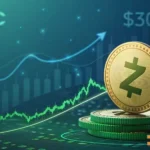- Rostin Behnam warns crypto will stay unregulated without expanded CFTC authority.
- Dual oversight could legitimize crypto, but may also create regulatory confusion.
With Donald Trump stepping in as the 47th U.S. president, a new wave of shifts has begun to reshape the nation’s regulatory landscape, especially within the crypto industry.
While the SEC continues to oversee areas tied to securities, the CFTC’s influence appears to be diminishing, limited mostly to derivatives and spot markets.
This imbalance in regulatory authority has sparked fresh debate.
Former CFTC Chair issues warning
Former CFTC Chair Rostin Behnam recently warned that without expanded powers for the agency, the crypto sector could remain largely unregulated.
Speaking to Bloomberg on 28th May, Behnam echoed a key industry stance, affirming that cryptocurrencies should be treated as commodities.
He said,
“If you look at existing law, the few largest tokens are commodities, which means the SEC does not have jurisdiction over those tokens, which include Bitcoin and Ether.”
Behnam emphasized that neither the SEC nor the CFTC currently possesses the legal framework needed to fully regulate the crypto industry.
The SEC, limited by its mandate, cannot oversee commodities, and the CFTC focuses only on derivatives, creating a significant gap in regulating spot markets for digital assets.
Behnam warned that unless the CFTC gains new authority over non-security digital asset markets, the sector will remain largely unregulated.
What caused Behnam to come up with this?
This coincided with the Trump family’s involvement in crypto ventures like World Liberty Financial, memecoins, and a stablecoin project.
Many, including political strategist Sanders Townsend, claimed that Trump is using his presidency to advance his family’s crypto investments.
Hence, the dual oversight could legitimize the industry, enhance investor protections, and offer clearer regulations. It would also help distinguish securities from commodities, providing much-needed clarity for market participants.
Clearer regulations could encourage broader participation from institutional investors.
Challenges to have both the SEC and the CFTC?
However, regulatory overlap may confuse market participants and increase compliance burdens for crypto companies.
Conflicting mandates could also slow innovation, especially for startups struggling with fragmented rules.
Despite current friction, better coordination between agencies could strengthen the crypto market’s foundation.
That being said, no matter who oversees it, a well-regulated crypto system is essential, something Benham emphasized when he said,
“Regulators are extremely important. They’re the reason American markets are the most desired in the world.”







